Apps
Auto Added by WPeMatico
Auto Added by WPeMatico
3DEN is building spaces for what it calls the “in-between moments” of your day.
The name (pronounced “Eden”) comes from the idea of the “third place” — a space that’s neither home nor work. Founder and CEO Ben Silver told me the goal is to create a space that people can use if, say, they’ve got 45 minutes to fill between meetings, or if they’ve just gotten off a red-eye flight and need somewhere to freshen up.
Coffee shops, co-working spaces, gyms or hotels might serve some of those functions, but Silver said 3DEN is “aggregating many different services” and bringing them together into “a very reliable space.” He suggested that the closest analogue might be a members-only clubhouse — except that instead of charging a steep membership fee, 3DEN requires no commitment, with pricing starting at $6 for each 30 minutes of your visit.
Earlier this week, I dropped by the site of the first 3DEN, located in the shopping area of New York City’s Hudson Yards development. The space is still being built, but I saw booths for phone calls, private showers and even swings for relaxing.
Silver said there will be a meditation space and Casper nap pods, too. He emphasized the nature-inspired design, with plenty of trees and plants, as well as the space’s “acoustic zoning,” with some areas designated for socializing and others designed to be quieter and more restful.
So if you want to catch up on some work, make some calls or even host a meeting (you can invite and pay for up to two guests), you can do that. If you just want to chill out and relax, you can do that, too.
Silver said that while the space will be staffed with a few hosts, technology will be key to the experience, with most transactions being handled via smartphone app. If you’re interested in visiting an 3DEN space, you check-in via the app (which will tell you the current crowd level, and put you on the waiting list if the space is at capacity); you can also reserve a shower and make purchases.
3DEN’s core services will be included in that $6-per-half-hour price, but Silver said there will be a retail element as well, with visitors able to buy products in categories like food and health/beauty. He also said he’s exploring additional pricing models (such as corporate memberships) for regular guests, but he emphasized the importance of “no commitments” pricing that makes the space accessible to a wide swath of visitors.
The seed round was led by b8ta and Graphene Ventures, with participation from Colle Capital Partners, The Stable, JTRE, InVision CEO Clark Valberg, Target’s former Chief Strategy and Innovation Officer Casey Carl and Firebase founder Andrew Lee.
The first 3DEN location has a planned opening of March 15, and Silver said the company is also negotiating for four additional locations across New York City.
Powered by WPeMatico
TikTok is testing a new ad product: a sponsored video ad that directs users to the advertiser’s website. The test was spotted in the U.S. TikTok app, where a video labeled “Sponsored” from the bike retailer Specialized is showing up in the main feed, along with a blue “Lean More” button that directs users to tap to get more information.
Presumably, this button could be customized to send users to the advertiser’s website or any other web address, but for the time being it only opened the Specialized Bikes (@specializedbikes) profile page within the TikTok app.

However, the profile page itself also sported a few new features, including what appeared to be a tweaked version of the verified account badge.
Below the @specializedbikes username was “Specialized Bikes Page” and a blue checkmark (see below). On other social networks, checkmarks like this usually indicate a user whose account has gone through a verification process of some kind.
Typical TikTok user profiles don’t look like this — they generally only include the username. In some cases, we’ve seen them sport other labels like “popular creator” or “Official Account” — but these have been tagged with a yellowish-orange checkmark, not a blue one.
In addition, a pop-up banner overlay appeared at the bottom of the profile page, which directed users to “Go to Website” followed by another blue “Learn More” button.
Oddly, this pop-up banner didn’t show up all the time, and the “Learn More” button didn’t work — it only re-opened the retailer’s profile page.
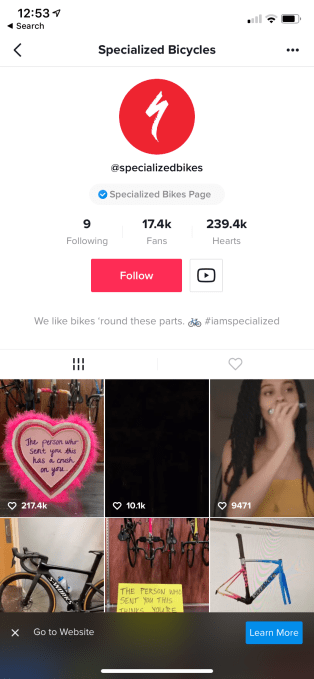
As for the video itself, it features a Valentine’s Day heart that you can send to a crush, and, of course, some bikes.
The music backing the clip is Breakbot’s “By Your Side,” but is labeled “Promoted Music.” Weirdly, when you tap on the “Promoted Music” you’re not taken to the soundbite on TikTok like usual, but instead get an error message saying “Ad videos currently do not support this feature.”
Rolling through TikTok and got an ad from Specialized Bikes that just takes you to their profile when you tap “Learn more” but then brings up “video ads do not support this feature” when you tap on the promoted music track. pic.twitter.com/hBmedThVON
— Jeff Higgins (The Cool One) (@ItsJeffHiggins) February 14, 2019
The glitches indicate this video ad unit is still very much in the process of being tested, and not a publicly available ad product at this time.
TikTok parent ByteDance only just began to experiment with advertising in the U.S. and U.K. in January.
So far, public tests have only included an app launch pre-roll ad. But according to a leaked pitch deck published by Digiday, there are four TikTok ad products in the works: a brand takeover, an in-feed native video ad, a hashtag challenge and a Snapchat-style 2D lens filter for photos; 3D and AR lens were listed as “coming soon.”
TikTok previously worked with GUESS on a hashtag challenge last year, and has more recently been running app launch pre-roll ads for companies like GrubHub, Disney’s Kingdom Hearts and others. However, a native video ad hadn’t yet been spotted in the wild until now.
According to estimates from Sensor Tower, TikTok has grown to nearly 800 million lifetime installs, not counting Android in China. Factoring that in, it’s fair to say the app has topped 1 billion downloads. As of last July, TikTok claimed to have more than 500 million monthly active users worldwide, excluding the 100 million users it gained from acquiring Musical.ly.
That’s a massive user base, and attractive to advertisers. Plus, native video ads like the one seen in testing would allow brands to participate in the community, instead of interrupting the experience the way video pre-rolls do.
TikTok has been reached for comment, but was not able to provide one at this time. We’ll update if that changes. Specialized declined to comment.
Powered by WPeMatico
Twitter has been secretly developing an enhanced camera feature that’s accessible with a swipe from the home screen and allows you to overlay captions on photos, videos, and Live broadcasts before sharing them to the timeline. Twitter is already used by people to post pictures and videos, but as it builds up its profile as a media company, and in the age of Snapchat and Instagram, it is working on the feature in hopes it will get people doing that even more.
Described in Twitter’s code as the “News Camera”, the Snapchat-style visual sharing option could turn more people into citizen journalists… or just get them sharing more selfies, reaction shots, and the world around them. Getting more original visual content into Twitter spices up the feed and could also help photo and video ads blend in.
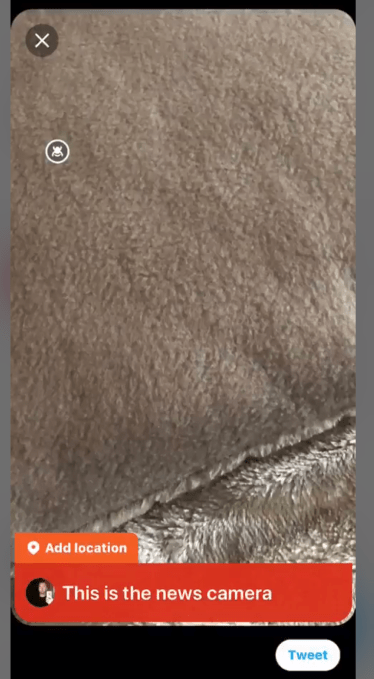
Prototypes of the new Twitter camera were first spotted by social media consultant Matt Navarra a week ago, and he produced a video of the feature today.
He describes the ability to swipe left from the homescreen to bring up the new unified capture screen. After you shoot some media, overlays appear prompting you to add a location and a caption to describe “what’s happening”. Users can choose from six colored backgrounds for the caption and location overlay card before posting, which lets you unite words and imagery on Twitter for the first time to make a splash with your tweets.
NEW! Twitter is testing a ‘News Camera’ feature…
Let’s you add location details and colour overlays to photos, videos, or live streams.
Has a redesigned composer UI too.
First spotted by me here: https://t.co/zVfXKJ8WBS pic.twitter.com/AwpHOpr9Vy
— Matt Navarra (@MattNavarra) February 14, 2019
Meanwhile, code digger and frequent TechCrunch tipster Jane Manchun Wong has found Twitter code describing how users should “Try the updated Twitter camera” to “capture photos, videos, and go live”. Bloomberg and CNBC had previously reported that Twitter was building an improved camera, but without feature details or screenshots.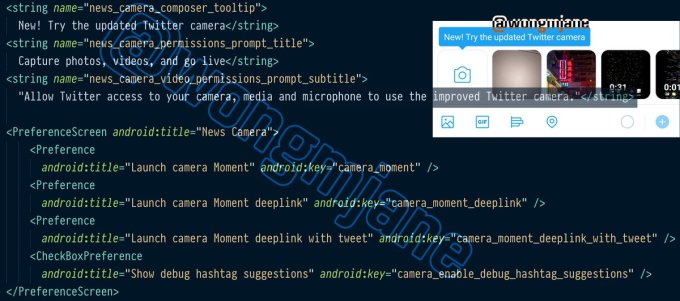
Twitter confirmed to TechCrunch that it’s currently developing the new camera feature. A Twitter spokesperson told us “I can confirm that we’re working on an easier way to share thing like images and videos on Twitter. What you’re seeing is in mid-development so it’s tough to comment on what things will look like in the final stage. The team is still actively working on what we’ll actually end up shipping.” When asked when it would launch, the spokesperson told us “Unfortunately we don’t have a timeline right now. You could expect the first half of this year.”
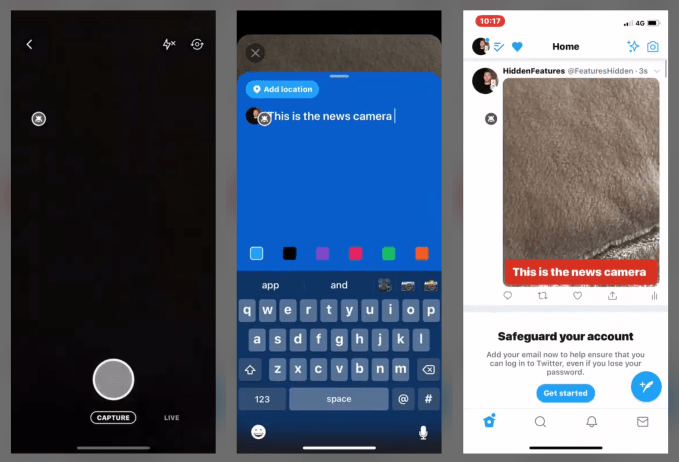
Twitter has largely sat by as visual sharing overtook the rest of the social media landscape. It’s yet to launch a Snapchat Stories feature like almost every other app — although you could argue that Moments was an effort to do that — and it seems to have neglected Persicope as the Live broadcasting trend waned. But the information density of all the words on Twitter might make it daunting to mainstream users compared to something easy and visual like Instagram.
This month, as it turns away from reporting monthly active users, Twitter reported daily active users for the first time, revealing it has 126 million that are monetizable compared to Snapchat’s 186 million while Instagram has over 500 million.
The new Twitter camera could make the service more appealing for people who see something worth sharing, but don’t always know what to say,
Powered by WPeMatico
Firefox for iOS is getting an update today that brings a new layout for its menu and settings, as well as new organization settings in the New Tabs features to iPhone and iPad users. But more importantly, it is also introducing persistent Private Browsing tabs that allow you to keep private browsing tabs alive across sessions.
Typically, when you exit Firefox, your private browsing sessions will exit, too. Now, when you relaunch Firefox, you’ll be right back in your private browsing sessions. And while it’s important to remember that private browsing doesn’t render you anonymous, it does automatically erase your cookies, passwords and browsing history. Sometimes you want those to persist across your sessions, though, given that it’s annoying to have to re-enter your passwords every time you quite the app, for example, and now Firefox lets you do that until you actively exit the private browsing mode.
 “Keeping your private browsing preferences seamless is just another way we’re making it simple and easy to give you back control of the privacy of your online experience,” Mozilla explains in today’s announcement.
“Keeping your private browsing preferences seamless is just another way we’re making it simple and easy to give you back control of the privacy of your online experience,” Mozilla explains in today’s announcement.
With this updates, users now also get different options to organize the view they see when they open a blank new tab. You can now chose between having new tabs open to your bookmarks list, Firefox Home (which features your top sites and recommendations from the Mozilla-owned Pocket), a list of your recent history or a custom URL (with your own homepage, for example). Or, if you just like to see a white page, you can also opt to see a blank page.
As for the new settings and menu layout, Mozilla notes that these now closely mirror the Firefox desktop version. That means you can now access your bookmarks, history, Reading List and download from the Library menu item, for example.
Powered by WPeMatico
Wattpad’s ambitions to grow beyond a storytelling community for young adults took another leap forward today with the announcement of a new partnership that will help expand its reach in Asia. The company has teamed up with Huayi Brothers in Korea, which will now be Wattpad’s exclusive entertainment partner in the region. The two companies will co-produce content sourced from Wattpad’s community as it’s adapted for film, TV and other digital media projects in the country.
Development deals like this are not new to Wattpad at this point.
In the U.S., the storytelling app made headlines for bringing to Netflix the teen hit “The Kissing Booth,” which shot up to become the No. 4 movie on IMDb for a time.
Wattpad also recently announced a second season for “Light as a Feather,” which it produces with AwesomenessTV and Grammnet for Hulu.
It additionally works with eOne, Sony, SYFY, Universal Cable Productions (a division of NBCUniversal) and Germany’s Bavaria Fiction.
Outside the U.S., Wattpad has 26 films in development with iflix in Indonesia.
And WattPad’s feature film “After,” based on Anna Todd’s novel, will arrive in theaters on April 12.
Key to these deals is Wattpad’s ability to source the best content from the 565 million stories on its platform. Do to so, it uses something it calls its “Story DNA Machine Learning technology,” which helps to deconstruct stories by analyzing things like sentence structure, word use, grammar and more in order to help identify the next big hits using more than just readership numbers alone.
The stories it identifies as promising are then sent over to content specialists (aka human editors) for further review.
This same combination of tech and human curation has been used in the past to help source its writing award winners and is now being used to find the next stories to be turned into novels for its new U.S. publishing arm, Wattpad Books.
In addition to its hit-finding technology, studios working with Wattpad also have a way to reach younger users who today are often out of touch with traditional media, as much of youth culture has shifted online.
These days, teens and young adults are more likely to know YouTube stars than Hollywood actors. They’re consuming content online in communities like Reddit, TikTok, Instagram, YouTube, Twitter and elsewhere. And when it comes to reading, they’re doing more of that online, too — whether that’s through chat fiction apps like Hooked or by reading Wattpad’s longer stories.
 Wattpad says it now has 70 million users worldwide, who now spend 22 billion combined minutes per month engaged with its website and app.
Wattpad says it now has 70 million users worldwide, who now spend 22 billion combined minutes per month engaged with its website and app.
With the Korean deal, Wattpad is further growing its international footprint after several other moves focused on its international expansions.
For example, today’s news follows Wattpad’s raise of $51 million in funding from Tencent; its appointment of its first Head of Asia for Wattpad Studios, Dexter Ong, last year; and its hiring of its first GM of India, Devashish Sharma, who is working with local partners to turn its stories into movies, TV, digital and print in the region.
Huayi Brothers Korea hasn’t announced any specific projects from the Wattpad deal at this point, but those will follow.
“Wattpad’s model is the future of entertainment, using technology to find great storytellers and bring them to an international audience,” said, Jay Ji, CEO, Huayi Brothers Korea, in a statement. “In an era of entertainment abundance, working with Wattpad means access to the most important things in the industry: a data-backed approach to development, and powerful, proven stories that audiences have already fall in love with,” he said.
Powered by WPeMatico
Apple has made a small but important change to iOS that will allow users an easier way to manage their app subscriptions. In the latest release of the mobile operating system (iOS 12.1.4 and 12.2 beta), the company has relocated the “Manage Subscriptions” setting so it’s only one click away when you tap on your profile in the App Store, instead of being buried more deeply within the settings.
This may seem like a minor change, but it was a much-needed one.
As more mobile apps have adopted subscriptions as a means of generating revenue, it’s become critical to ensure consumers know how to turn off their subscriptions. And, based on a reading of many angry App Store app reviews, many people don’t know how to do this. Most assume they should reach out to the developer to have their subscription disabled — after all, it’s the developer who’s charging them.
It’s not really the customer’s fault for being unaware of how the process works, as Apple had made getting to the subscription management screen far more difficult than it should be.
In iOS Settings, for example, you would have to click iTunes & App Store –> Apple ID: –> View Apple ID –> then scroll all the way to the bottom of the screen to find the hidden setting.
In the iOS App Store app, it was a bit simpler.
You would first have to tap your profile icon on the top right of the Home page, then your Apple ID, then scroll down to the bottom of the page again.
By comparison, Google Play put subscriptions in its top-level navigation with no scrolling or extra clicks required.
With the iOS update, when you now tap your profile icon in the App Store, “Manage Subscriptions” is right there — and it’s accessible without scrolling. That’s a huge help in making this critical feature more accessible.
Unfortunately, Apple hasn’t made a similar change to simplify the path to subscription management in iOS’s main Settings.
The change was first spotted by MacStories Editor-in-Chief Federico Viticci, who shared a screenshot on Twitter.
Apple recently made a change (seems iOS 12.1.4 and 12.2 beta) to make it easier to manage subscriptions for iOS apps.
Now you just need to open the App Store, tap your profile, and choose ‘Manage Subscriptions’. pic.twitter.com/4PtxvAQjTm
— Federico Viticci (@viticci) February 13, 2019
Subscriptions are now one of the main driving forces behind the increase in consumer spending on iPhone.
A recent Sensor Tower report said that iPhone users in the U.S. on average spent $79 on apps in 2018, up 36 percent from last year. Much of that is due to mobile gaming, as always, but subscription-based apps are now playing a large role.
Unfortunately, not all developers have been playing by the rules. Many app makers were using misleading tactics to force users to subscribe — like hiding the true costs, using confusing buttons and user interfaces or suggesting they join a free trial that ends up only lasting three days.
Apple later updated its App Store guidelines to further spell out what is and is not allowed.
But making the rules and enforcing them are two different matters. In the meantime, being able to figure out which subscriptions you have and turning off those you don’t want needed to be simpler.
Also related to this is the fact that Apple is preparing to launch some new subscriptions of its own — presumably, its long-awaited streaming video service and perhaps the news subscription service as well — at a press event in March.
The update to subscriptions appears to be rolled out worldwide for those on the latest version of iOS.
Powered by WPeMatico
Insta-chat addicts, rejoice. You could soon be trading memes and emojis from your computer. Instagram is internally testing a web version of Instagram Direct messaging that lets people chat without the app. If, or more likely, when this rolls out publicly, users on a desktop or laptop PC or Mac, a non-Android or iPhone or that access Instagram via a mobile web browser will be able to privately message other Instagrammers.
Instagram web DMs was one of the features I called for in a product wish list I published in December alongside a See More Like This button for the feed and an upload quality indicator so your Stories don’t look crappy if you’re on a slow connection.
A web version could make Instagram Direct a more full-fledged SMS alternative rather than just a tacked-on feature for discussing the photo and video app’s content. Messages are a massive driver of engagement that frequently draws people back to an app, and knowing friends can receive them anywhere could get users sending more. While Facebook doesn’t monetize Instagram Direct itself, it could get users browsing through more ads while they wait for replies.
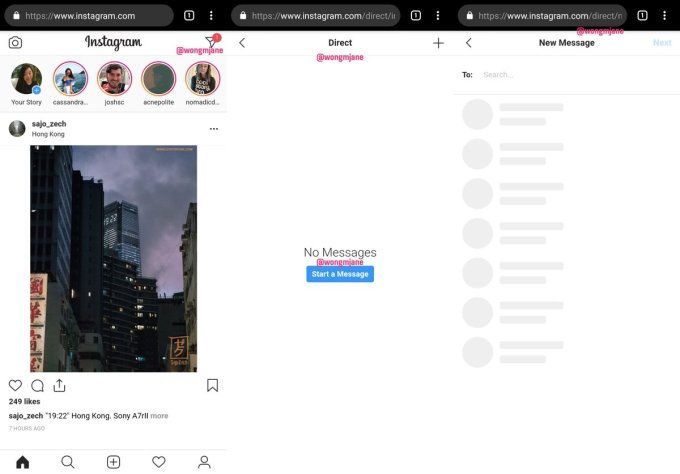
Given Facebook’s own chat feature started on the web before going mobile and getting its own Messenger app, and WhatsApp launched a web portal in 2015 followed by desktop clients in 2016, it’s sensible for Instagram Direct to embrace the web too. It could also pave the way for Facebook’s upcoming unification of the backend infrastructure for Messenger, WhatsApp and Instagram Direct that should expand encryption and allow cross-app chat, as reported by The New York Times’ Mike Isaac.
Mobile reverse-engineering specialist and frequent TechCrunch tipster Jane Manchun Wong alerted us to Instagram’s test. It’s not available to users yet, as it’s still being internally “dogfooded” — used heavily by employees to identify bugs or necessary product changes. But she was able to dig past security and access the feature from both a desktop computer and mobile web browser.
 In the current design, Direct on the web is available from a Direct arrow icon in the top right of the screen. The feature looks like it will use an Instagram.com/direct/…. URL structure. If the feature becomes popular, perhaps Facebook will break it out with its own Direct destination website similar to https://www.messenger.com, which launched in 2015. Instagram began testing a standalone Direct app last year, but it’s yet to be officially launched and doesn’t seem exceedingly popular.
In the current design, Direct on the web is available from a Direct arrow icon in the top right of the screen. The feature looks like it will use an Instagram.com/direct/…. URL structure. If the feature becomes popular, perhaps Facebook will break it out with its own Direct destination website similar to https://www.messenger.com, which launched in 2015. Instagram began testing a standalone Direct app last year, but it’s yet to be officially launched and doesn’t seem exceedingly popular.
Instagram’s web experience has long lagged behind its native apps. You still can’t post Stories from the desktop like you can with Facebook Stories. It only added notifications on the web in 2016 and Explore, plus some other features, in 2017.
Instagram did not respond to requests for comment before press time. The company rarely provides a statement on internal features in development until they’re being externally tested on the public, at which point it typically tells us “We’re always testing ways to improve the Instagram experience.” [Update: Instagram confirms to TechCrunch it’s not publicly testing this, which is its go-to line when a product surfaces that’s still in internal development. Meanwhile, Wong notes that Instagram has now cut off her access to the web Direct feature.]
After cloning Snapchat Stories to create Instagram Stories, the Facebook-owned app decimated Snap’s growth rate. That left Snapchat to focus on premium video and messaging. Last year Instagram built IGTV to compete with Snapchat Discover. And now with it testing a web version of Direct, it seems poised to challenge Snap for chat too.
Powered by WPeMatico
Facebook and Google were far from the only developers openly abusing Apple’s Enterprise Certificate program meant for companies offering employee-only apps. A TechCrunch investigation uncovered a dozen hardcore pornography apps and a dozen real-money gambling apps that escaped Apple’s oversight. The developers passed Apple’s weak Enterprise Certificate screening process or piggybacked on a legitimate approval, allowing them to sidestep the App Store and Cupertino’s traditional safeguards designed to keep iOS family-friendly. Without proper oversight, they were able to operate these vice apps that blatantly flaunt Apple’s content policies.
The situation shows further evidence that Apple has been neglecting its responsibility to police the Enterprise Certificate program, leading to its exploitation to circumvent App Store rules and forbidden categories. For a company whose CEO Tim Cook frequently criticizes its competitors for data misuse and policy fiascos like Facebook’s Cambridge Analytica, Apple’s failure to catch and block these porn and gambling demonstrates it has work to do itself.

Porn apps PPAV and iPorn (iP) continue to abuse Apple’s Enterprise Certificate program to sidestep the App Store’s ban on pornography. Nudity censored by TechCrunch
TechCrunch broke the news last week that Facebook and Google had broken the rules of Apple’s Enterprise Certificate program to distribute apps that installed VPNs or demanded root network access to collect all of a user’s traffic and phone activity for competitive intelligence. That led Apple to briefly revoke Facebook and Google’s Certificates, thereby disabling the companies’ legitimate employee-only apps, which caused office chaos.
Apple issued a fiery statement that “Facebook has been using their membership to distribute a data-collecting app to consumers, which is a clear breach of their agreement with Apple. Any developer using their enterprise certificates to distribute apps to consumers will have their certificates revoked, which is what we did in this case to protect our users and their data.” Meanwhile, dozens of prohibited apps were available for download from shady developers’ websites.
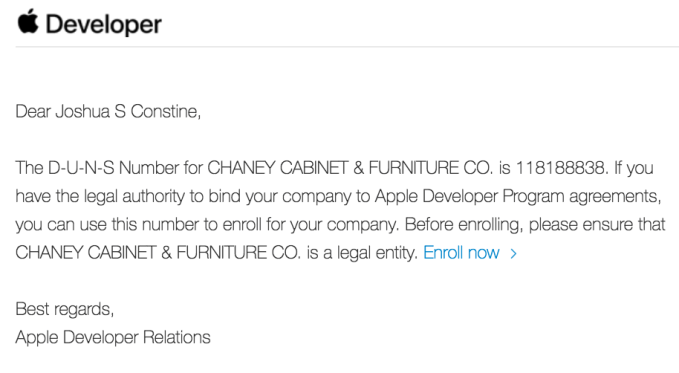
Apple offers a lookup tool for finding any business’ D-U-N-S number, allowing shady developers to forge their Enterprise Certificate application
The problem starts with Apple’s lax standards for accepting businesses to the enterprise program. The program is for companies to distribute apps only to their employees, and its policy explicitly states “You may not use, distribute or otherwise make Your Internal Use Applications available to Your Customers.” Yet Apple doesn’t adequately enforce these policies.
Developers simply have to fill out an online form and pay $299 to Apple, as detailed in this guide from Calvium. The form merely asks developers to pledge they’re building an Enterprise Certificate app for internal employee-only use, that they have the legal authority to register the business, provide a D-U-N-S business ID number and have an up to date Mac. You can easily Google a business’ address details and look up their D-U-N-S ID number with a tool Apple provides. After setting up an Apple ID and agreeing to its terms of service, businesses wait one to four weeks for a phone call from Apple asking them to reconfirm they’ll only distribute apps internally and are authorized to represent their business.
With just a few lies on the phone and web plus some Googleable public information, sketchy developers can get approved for an Apple Enterprise Certificate.

Real-money gambling apps openly advertise that they have iOS versions available that abuse the Enterprise Certificate program
Given the number of policy-violating apps that are being distributed to non-employees using registrations for businesses unrelated to their apps, it’s clear that Apple needs to tighten the oversight on the Enterprise Certificate program. TechCrunch found thousands of sites offering downloads of “sideloaded” Enterprise apps, and investigating just a sample uncovered numerous abuses. Using a standard un-jailbroken iPhone. TechCrunch was able to download and verify 12 pornography and 12 real-money gambling apps over the past week that were abusing Apple’s Enterprise Certificate system to offer apps prohibited from the App Store. These apps either offered streaming or pay-per-view hardcore pornography, or allowed users to deposit, win and withdraw real money — all of which would be prohibited if the apps were distributed through the App Store.

A whole screen of prohibited sideloaded porn and gambling apps TechCrunch was able to download through the Enterprise Certificate system
In an apparent effort to step up policy enforcement in the wake of TechCrunch’s investigation into Facebook and Google’s Enterprise Certificate violations, Apple appears to have disabled some of these apps in the past few days, but many remain operational. The porn apps that we discovered which are currently functional include Swag, PPAV, Banana Video, iPorn (iP), Pear, Poshow and AVBobo, while the currently functional gambling apps include RD Poker and RiverPoker.
The Enterprise Certificates for these apps were rarely registered to company names related to their true purpose. The only example was Lucky8 for gambling. Many of the apps used innocuous names like Interprener, Mohajer International Communications, Sungate and AsianLiveTech. Yet others seemed to have forged or stolen credentials to sign up under the names of completely unrelated but legitimate businesses. Dragon Gaming was registered to U.S. gravel supplier CSL-LOMA. As for porn apps, PPAV’s certificate is assigned to the Nanjing Jianye District Information Center, Douyin Didi was licensed under Moscow motorcycle company Akura OOO, Chinese app Pear is registered to Grupo Arcavi Sociedad Anonima in Costa Rica and AVBobo covers its tracks with the name of a Fresno-based company called Chaney Cabinet & Furniture Co.
You can see a full list of the policy-violating apps we found:
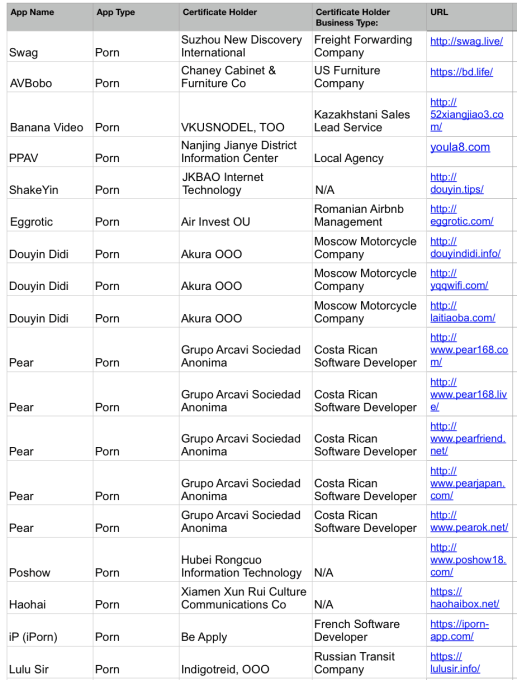

Apple refused to explain how these apps slipped into the Enterprise Certificate app program. It declined to say if it does any follow-up compliance audits on developers in the program or if it plans to change admission process. An Apple spokesperson did provide this statement, though, indicating it will work to shut down these apps and potentially ban the developers from building iOS products entirely:
“Developers that abuse our enterprise certificates are in violation of the Apple Developer Enterprise Program Agreement and will have their certificates terminated, and if appropriate, they will be removed from our Developer Program completely. We are continuously evaluating the cases of misuse and are prepared to take immediate action.”
TechCrunch asked Guardian Mobile Firewall’s security expert Will Strafach to look at the apps we found and their Certificates. Strafach’s initial analysis of the apps didn’t find any glaring evidence that the apps misappropriate data, but they all do violate Apple’s Certificate policies and provide content banned from the App Store. “At the moment, I have noticed that action is slower regarding apps available from an independent website and not these easy-to-scrape app directories” that occasionally crop up offering centralized access to a plethora of sideloaded apps.

Porn app AVBobo uses an Enterprise Certificate registered to Fresno’s Chaney Cabinet & Furniture Co
Strafach explained how “A significant number of the Enterprise Certificates used to sign publicly available apps are referred to informally as ‘rogue certificates’ as they are often not associated with the named company. There are no hard facts to confirm the manner in which these certificates originate, but the result of the initial step is that individuals will gain control of an Enterprise Certificate attributable to a corporation, usually China/HK-based. Code services are then sold quietly on Chinese language marketplaces, resulting in sometimes 5 to 10 (or more) distinct apps being signed with the same Enterprise Certificate.” We found Sungate and Mohajer Certificates were farmed out for use by multiple apps in this way.
“In my experience, Enterprise Certificate signed apps available on independent websites have not been harmful to users in a malicious sense, only in the sense that they have broken the rules,” Strafach notes. “Enterprise Certificate signed apps from these Chinese ‘helper’ tools, however, have been a mixed bag. Zoe example, in multiple cases, we have noticed such apps with additional tracking and adware code injected into the original now-repackaged app being offered.”
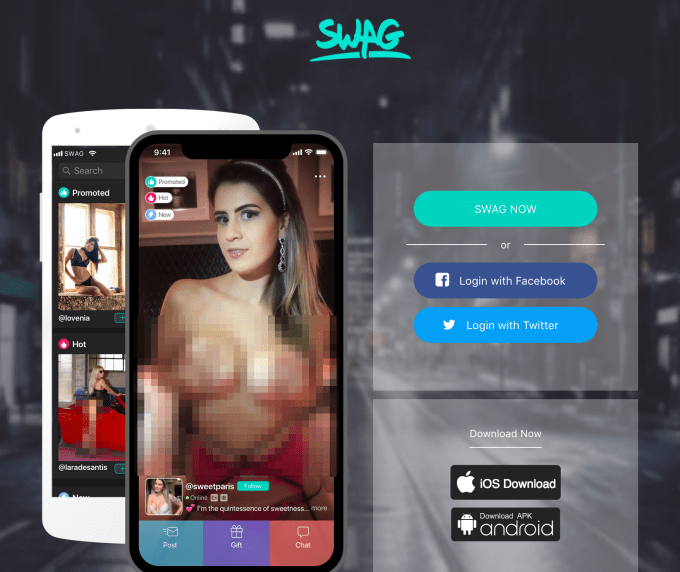
Porn apps like Swag openly advertise their availability on iOS
Interestingly, none of the off-limits apps we discovered asked users to install a VPN like Google Screenwise, let alone root network access like Facebook Research. TechCrunch reported this month that both apps had been paying users to snoop on their private data. But the iOS versions were banned by Apple after we exposed their policy violations, and Apple also caused chaos at Facebook and Google’s offices by temporarily shutting down their employee-only iOS apps too. The fact that these two U.S. tech giants were more aggressive about collecting user data than shady Chinese porn and gambling apps is telling. “This is a cat-and-mouse game,” Strafach concluded regarding Apple’s struggle to keep out these apps. But given the rampant abuse, it seems Apple could easily add stronger verification processes and more check-ups to the Enterprise Certificate program. Developers should have to do more to prove their apps’ connection with the Certificate holder, and Apple should regularly audit certificates to see what kind of apps they’re powering.
Back when Facebook missed Cambridge Analytica’s abuse of its app platform, Cook was asked what he’d do in Mark Zuckerberg’s shoes. “I wouldn’t be in this situation” Cook frankly replied. But if Apple can’t keep porn and casinos off iOS, perhaps Cook shouldn’t be lecturing anyone else.
Powered by WPeMatico
Apple’s push to get developers to build subscription-based apps is now having a notable impact on App Store revenues. According to a new report from Sensor Tower due out later this week, revenue generated per U.S. iPhone grew 36 percent, from $58 in 2017 to $79 last year. As is typical, much of that increase can be attributed to mobile gaming, which accounted for more than half of this per-device average. However, more substantial growth took place in the categories outside of gaming — including those categories where subscription-based apps tend to rule the top charts, the firm found.
According to the report’s findings, per-device app spending in the U.S. grew more over the past year than it did in 2017.
From 2017 to 2018, iPhone users spent an average of $21 or more on in-app purchases and paid app downloads — a 36 percent increase compared with the 23 percent increase from 2016 to 2017, when revenue per device grew from $47 to $58.
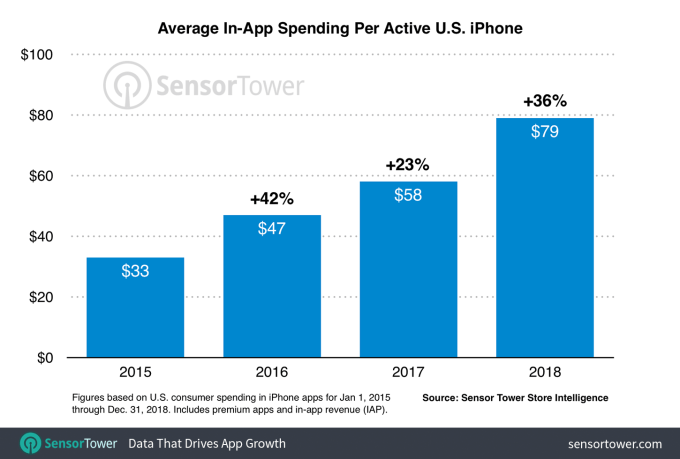
However, 2018’s figure was slightly lower than the 42 percent increase in average per-device spending seen between 2015 and 2016, when revenue grew from $33 to $47, noted Sensor Tower.
As usual, mobile gaming continued to play a large role in iPhone spending. In 2018, gaming accounted for nearly 56 percent of the average consumer spend — or $44 out of the total $79 spent per iPhone.
But what’s more interesting is how the non-gaming categories fared this past year.
Some categories — including those where subscription-based apps dominate the top charts — saw even higher year-over-year growth in 2018, the firm found.
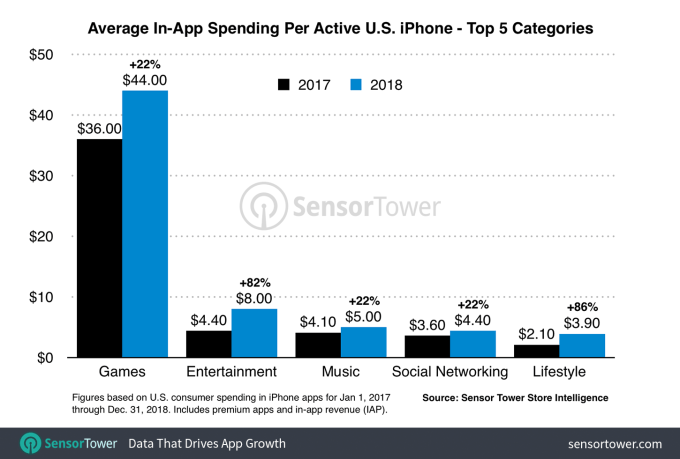
For example, Entertainment apps grew their spend per device increase by 82 percent to $8 of the total in 2018. Lifestyle apps increased by 86 percent to reach $3.90, up from $2.10.
And though it didn’t make the top five, Health & Fitness apps also grew 75 percent year-over-year to account for an average of $2.70, up from $1.60 in 2017.
Other categories in the top five included Music and Social Networking apps, which both grew by 22 percent.
This data indicates that subscription apps are playing a significant role in helping drive iPhone consumer spending higher.
The news comes at a time when Apple has reported slowing iPhone sales, which is pushing the company to lean more on services to continue to boost its revenue. This includes not just App Store subscriptions, but also things like Apple Music, Apple Pay, iCloud, App Store Search ads, AppleCare and more.
As subscriptions become more popular, Apple will need to remain vigilant against those who would abuse the system.
For example, a number of sneaky subscription apps were found plaguing the App Store in recent weeks. They were duping users into paid memberships with tricky buttons, hidden text, instant trials that converted in days and the use of other misleading tactics.
Apple later cracked down by removing some of the apps, and updated its developer guidelines with stricter rules about how subscriptions should both look and operate.
A failure to properly police the App Store or set boundaries to prevent the overuse of subscriptions could end up turning users off from downloading new apps altogether — especially if users begin to think that every app is after a long-term financial commitment.
Developers will need to be clever to convert users and retain subscribers amid this shift away from paid apps to those that come with a monthly bill. App makers will need to properly market their subscription’s benefits, and even consider offering bundles to increase the value.
But in the near-term, the big takeaway for developers is that there is still good money to be made on the App Store, even if iPhone sales are slowing.
Powered by WPeMatico
Last week TechCrunch reported that Reddit was raising $150 million from Chinese tech giant Tencent and up to $150 million more in a Series D that would value the company at $2.7 billion pre-money or $3 billion post-money. After no-commenting on our scoop, today Reddit confirmed it has raised $300 million at $3 billion post-money, with $150 million from Tencent.
The deal makes for an odd pairing between one of the architects of China’s Great Firewall of censorship and one of America’s most lawless free-speech forums. Some Redditors are already protesting the funding by trying to post content that would rile Chinese’s internet watchdogs, like imagery from Tiananmen Square and Winnie the Pooh memes mocking Chinese President Xi Jinping’s appearance.
The round brings the Conde Nast-majority owned Reddit to $550 million in total funding. Beyond Tencent, the rest of the round came from previous investors potentially including Andreessen Horowitz, Sequoia and Fidelity. Apparently frustrated that we had disrupted its PR plan, Reddit today handed confirmation of the round to CNBC, which re-reported our scoop without citation. While CNBC reported in June 2018 that Reddit would top $100 million in revenue, a reliable source tells us Reddit only brought in $85 million in 2018 revenue.
Reddit’s CEO Steve Huffman has had his own problems with attribution after the exec was caught editing users’ comments to mislead viewers into thinking they were insulting their Subreddit’s moderators. Huffman managed to get off with just an apology and vow not to do it again, though he seemed to laugh off and excuse the abuse of power by saying “I spent my formative years as a young troll on the Internet.”
Reddit will have to compete for ad dollars with the Google-Facebook duopoly despite having less information about its users, who are often anonymous. Reddit sees 330 million users per month across its Subreddit forums for discussing everything from news and entertainment to niche types of pornography, conspiracy theories and other highly brand-unsafe content. Meanwhile, users may be concerned that Reddit’s policy views could be tightened as it cosies up to Tencent.
Reddit has struggled with staff departures and user revolts over the years as it tries to balance freedom of expression with civility. The hope is the cash could help it pay for experienced leaders and more moderation staff to maintain that balance. But without proper oversight, the cash could simply scale up Reddit and its problems along with it.
Powered by WPeMatico